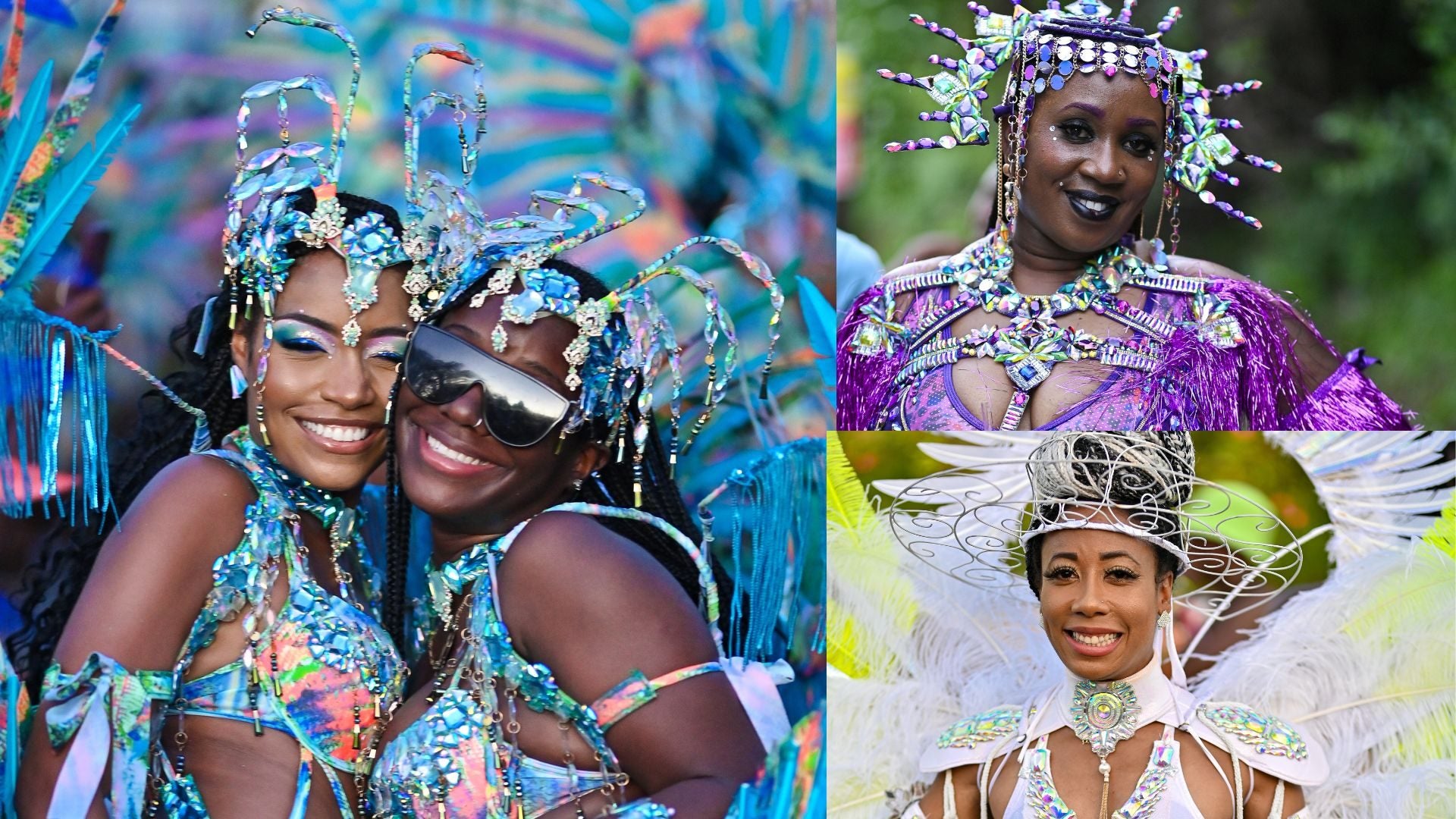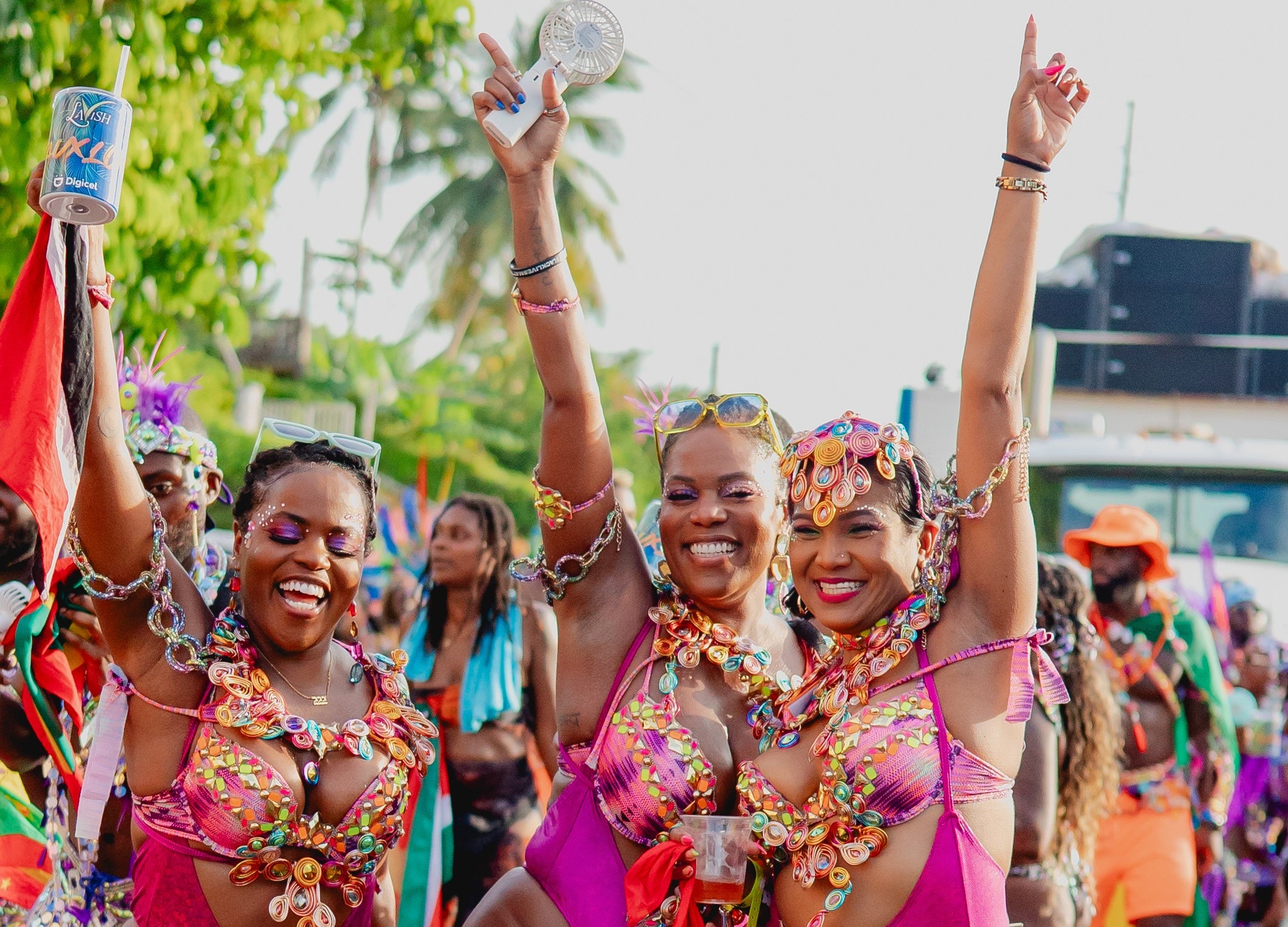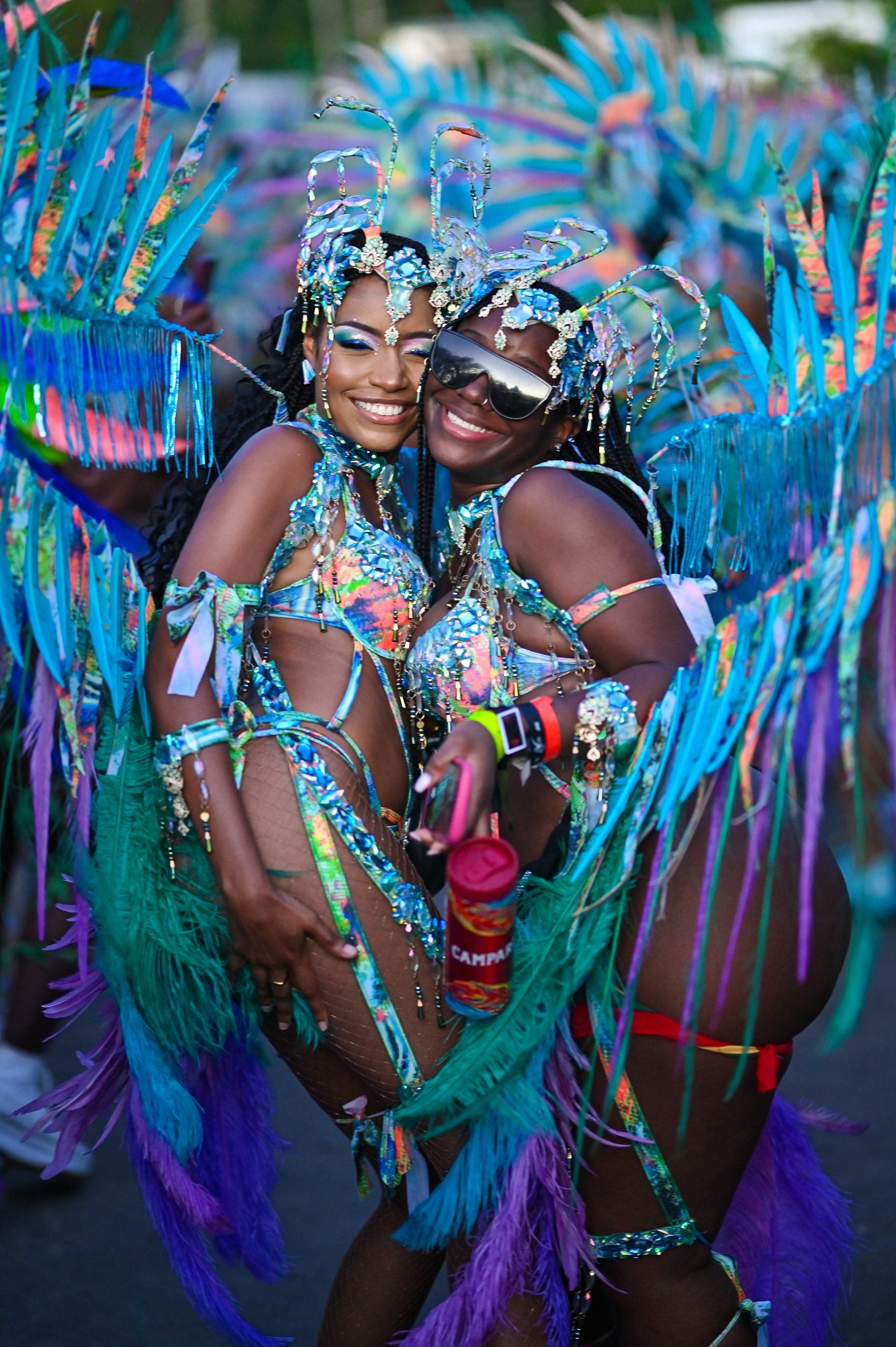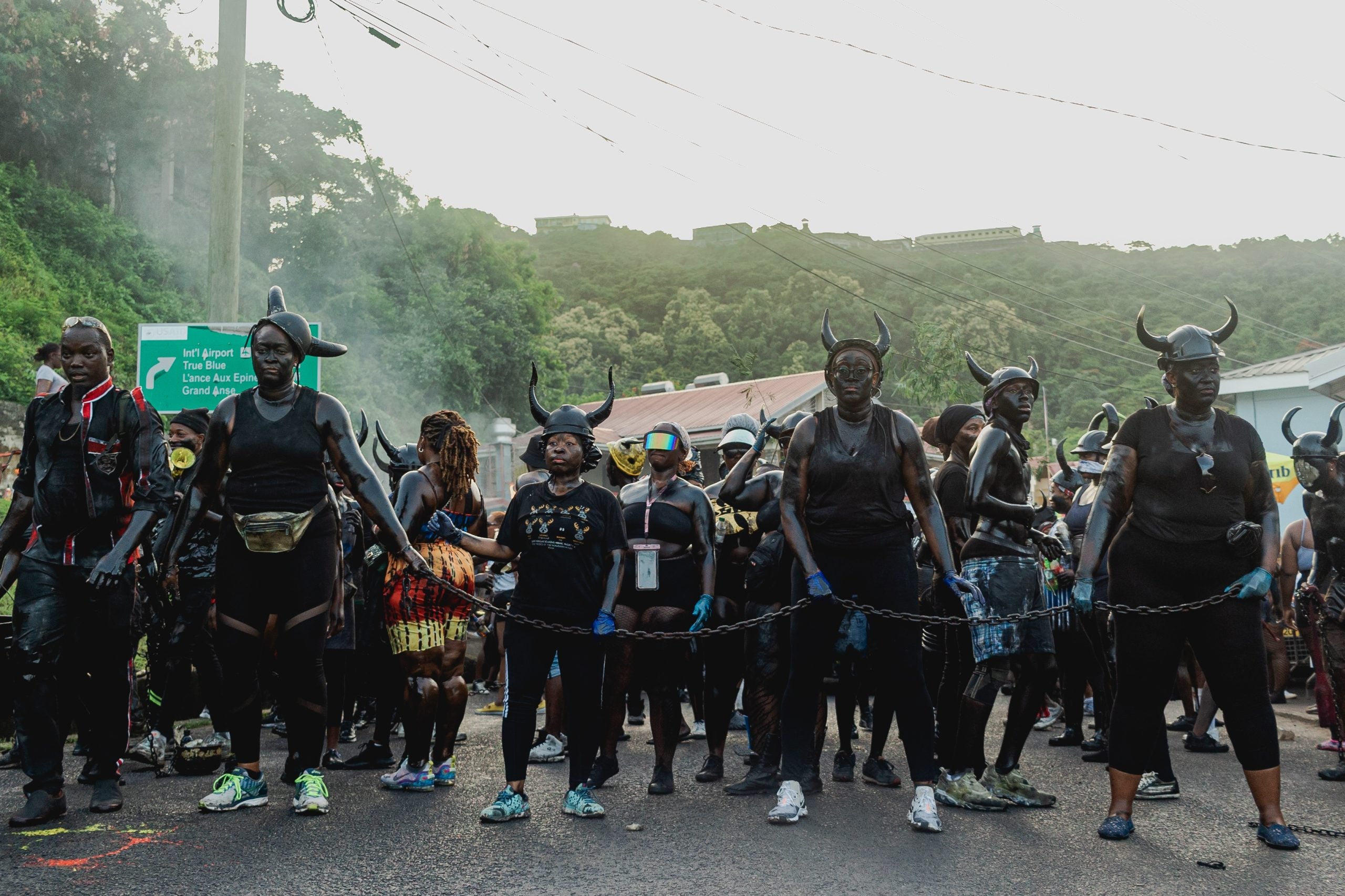
Grenada’s Spicemas is much more than a celebration. It’s a pulsating heartbeat of the island’s culture, history and spirit on a stage where the past and present intertwine. It’s about freedom and liberation in every sense. It recognizes the emancipation of the African people who were once enslaved there, while also creating space for current and future generations to come together in community and share joy with one another. It does this for all, but especially for Black women.
As a Black American woman, I’d never attended a Caribbean Carnival. I didn’t know much about it, aside from the vibrant images I’d seen on social media from time to time. Making my way to Grenada for Spicemas — my first Carnival — was exciting and intimidating. But once I landed, I immediately felt the energy of the season. It was infectious in the best way. It was the beginning of a trip that made me feel more at home in my body than I’ve ever felt. Alongside thousands of other Black women of all shapes and shades who were having the same experience. Hips swaying and Black skin shining beneath the most beautiful and intricate costumes — Carnival is woman. That’s the saying, and that’s the truth.

Women Behind The Mas
Carnival’s roots stretch deep into the history of the Caribbean, born out of the fusion of African traditions and European colonial influences. Historically, Carnival was once dominated by men. However, over time, women have carved out their space within the festivities. They’ve brought new dimensions to the celebration, embodying resistance, resilience and the reclaiming of cultural narratives.
For example, when Ebony Telesford, co-founder of the carnival mas band Lavish, was thinking of themes for the 2024 carnival season, she and her team came up with “Fauxlore,” which incorporated traditional mas characters with a modern twist. “It’s a play on the folklore characters, giving them a second persona so they can play mas.”
That type of innovation from women has become integral to Carnival and its continued growth.

Telesford highlights that while male-led bands are still dominant, women make up the majority of Carnival participants. “If you look at the other bands throughout the Caribbean, most of them are owned by men. But when you look at who is playing Carnival, it’s mostly women. It’s usually around 80% women,” said Telesford. “The majority of people on my team are women, and I feel like that gives me the edge against the other bands because there are more men than women band leaders in my country. I know what we [women] like. I know what we want. I know the types of amenities that we would want to include. We know what we would want to see on our bodies, what we would feel comfortable with,” she shared with ESSENCE.
This nuanced understanding of women’s needs during Carnival is echoed by Solange Thomas Dowden, founder of Valini Courier and Concierge Services, who says her goal is to ensure that women are not only receiving their costumes on time but feel fully supported throughout the Carnival journey. Her business goes beyond deliveries, offering hands-on assistance to help women fit their costumes, ensuring they feel confident and empowered. “Having women directly involved in executing Carnival services is crucial because only a woman truly understands the full essence of another woman,” she said. Valini’s services span from organizing party itineraries and island activities to providing childcare and educating visitors about Spicemas traditions like J’ouvert, all with an intimate knowledge of what women value most during Carnival. “As women, from a concierge aspect, we’re able to curate our packages keeping in mind what we know a woman may want or need,” said Thomas Dowden.
As Spicemas continues to thrive with the invaluable contributions of women, these women behind the mas say there is still room for greater representation at the leadership level. “I served as Interim Chair on the Spicemas Board of Directors in 2017, and after that, Jocelyn Sylvester-Gary has been the only woman that I know of that was there on a permanent level. Outside of that, it was always men; in the 30 years, all you’ve had were male chairpersons,” said Shirma Wells, author and former CEO of the Grenada Cultural Foundation. “I hope that going forward we can have greater involvement at the decision level, the implementing level, with women,” she shared. Wells hopes that as Carnival continues to evolve, more women will be empowered to shape its future at every level, ensuring that their perspectives are woven into the fabric of the festival’s growth.
A Different Kind Of Beauty
In Grenada, Black femininity is a complex and multifaceted experience. It’s a space where beauty is not defined by Eurocentric standards but by the uninhibited expression of self. Carnival allows women to step outside of the roles and expectations placed on us by society. It’s about embracing all parts of yourself and finding power in that.
Today, Spicemas sees an increasing number of women participating, not just in Pretty Mas, but across all aspects of Carnival. This surge in participation reflects a broader shift in the Caribbean’s cultural landscape, where women are embracing their power and influence.
Pretty Mas, often characterized by elaborate costumes and a celebration of beauty, is one area where women’s presence is most visible. Still, Spicemas also offers a space for exploring femininity beyond the traditional confines of beauty. Here, Black femininity is not confined to what is “pretty.” It’s raw, powerful, and unrestrained, especially during Jab Jab, where participants smear themselves in black oil, paint, or charcoal, embodying the spirit of rebellion and freedom. When asked if she’s seen an increase in women participating in Jab, Wells replied, “Oh yes. In a big way.”

Traditionally dominated by men, Jab Jab, one of the most iconic aspects of Spicemas, has evolved to include a significant number of women who bring their own flair to the festivities. These women bring an energy that speaks to both resistance and liberation — as descendants of enslaved people and as women. “Women want to experience that freedom of expression because that is what it’s all about, and the younger women, in particular, are very much attracted to that sort of thing,” explains Wells. “We’ve seen quite a significant increase in women in Jab.”
This embrace of all aspects of femininity is what makes Grenada’s Spicemas unique. It challenges the notion that femininity must be soft and delicate. Instead, it celebrates the strength, resilience and unapologetic boldness of women in the Caribbean.
Past And Present Liberation
Carnival is a celebration of the collective liberation of Caribbean countries from colonial rule. At the same time, for many people, it’s a moment of freedom from societal constraints. It’s a space where you can just be. “Carnival is meant to be a liberating experience. As Black women, typically, the world tries to come down on us. But once you experience a Caribbean Carnival in its truest essence, you’re able to just let go and enjoy yourself, enjoy your body,” said Thomas Dowden. “That’s what Carnival is — body positivity, freedom and emancipation in all of the meanings of that word.” I couldn’t agree more.
At the same time, Spicemas in particular, is its own type of Carnival, rooted in Grenadian history and culture. With its evolution and expansion, preservation is also key. “I would certainly like to see efforts placed on ensuring that we maintain that unique Grenadian identity in Mas as much as possible,” said Wells. “I think we can have a combination of all the fancy — the feathers, beads and so on — and at the same time, preserve what is also authentically Grenadian in the process.”
As a Black woman, Spicemas felt liberating on a level that transcended the physical. Living in a world where my Blackness and my womanhood are constantly being policed, having this space to just be — among other Black women, who could just be — was truly transformative.
Not only did I feel a newfound confidence in my body, stretch marks and all, I felt released from limitations, burdens and many of the obstacles faced in my daily life. The shedding of those feelings, even if just for a few days, was a gift.
Engagement Across The Diaspora
There’s something powerful about connecting with Black cultures and histories across the diaspora, especially considering that, although our ancestors ended up in different parts of the world, they were brought from the same place. During my first visit to Grenada in 2019, I connected with a local gentleman through a mutual friend. He drove me around and showed me the sights. We arrived at one location near a waterfall, and the folks at the entrance gestured for us to enter. He laughed and said, “They think you’re a local. You look like you belong here.” There’s more that connects us than divides us. When we engage with different Black cultures, where we expand our own understanding of what it means to be Black. It gives us an opportunity to connect with our roots, celebrate our diversity, and strengthen the bonds that unite our global Black community.
Grenada’s Spicemas offers a unique opportunity for Black folks across the diaspora to engage with a different facet of Black culture — from the present-day experience to its storied history. Because Carnival is more than just a celebration; it’s a powerful expression of identity, resistance and freedom. For Black women, in particular, Spicemas is a reminder of our strength, our beauty, and our right to take up space in the world on our own terms.